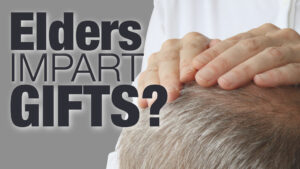Elders Impart Gifts?
Elders Impart Gifts?
The ability to perform miracles in the first century church was granted by God in essentially two ways: baptism of the Holy Spirit and the laying on of the apostles’ hands. The Bible only explicitly mentions the former avenue as occurring twice (Acts 2 and Acts 10), and then only for special and limited purposes, with a third occurrence implied in connection with Paul’s unique calling (Acts 9:15; 22:21; Romans 1:5; 11:13; 1 Corinthians 15:8; Galatians 1:16; 2:7-8; et al.). The latter avenue is specifically described by Luke in his account of the initial proclamation of the Gospel to the Samaritans:
Now when the apostles who were at Jerusalem heard that Samaria had received the word of God, they sent Peter and John to them, who, when they had come down, prayed for them that they might receive the Holy Spirit. For as yet He had fallen upon none of them. They had only been baptized in the name of the Lord Jesus. Then they laid hands on them, and they received the Holy Spirit. And when Simon saw that through the laying on of the apostles’ hands the Holy Spirit was given, he offered them money, saying, “Give me this power also, that anyone on whom I lay hands may receive the Holy Spirit” (Acts 8:14-19).
Since the New Testament expounds no other means by which any person may receive the ability to perform miracles, it inevitably follows that no person living on Earth today has miraculous capability. Holy Spirit baptism was unique, exclusive, and limited at the beginning of the church, and no apostles are alive today to impart miraculous ability to anyone.1
Some have challenged the exclusive nature of the role of the apostles in their unique ability to impart miraculous capability by calling attention to the admonition given by Paul to Timothy: “Do not neglect the gift that is in you, which was given to you by prophecy with the laying on of the hands of the eldership” (1 Timothy 4:14). Based on this verse, some insist that the apostles were not the only conduit through which God would impart miraculous ability. The “eldership” in the New Testament refers to a group of individuals who, having met certain very specific qualifications (1 Timothy 3:1-7; Titus 1:5-9; et al.), were appointed by the congregation where they were members to serve in the capacity of shepherds. Paul appears to indicate in this verse that these men imparted to Timothy the miraculous gift which he possessed.
However, in another passage, Paul indicated that he was the source of Timothy’s gift. 2 Timothy 1:6 reads: “Therefore I remind you to stir up the gift of God which is in you through the laying on of my hands.” So which is it? Was Timothy’s miraculous ability conferred upon him by Paul, by the eldership, or by both? The answer is seen in a closer examination of the original language, specifically, the use and meaning of two prepositions.
In 2 Timothy 1:6, where Paul claimed sole credit for imparting the gift to Timothy, the Holy Spirit employed the Greek preposition dia with the genitive (translated “through”) which means “through” or “by means of.”2 However, in 1 Timothy 4:14, where Paul alluded to the nature of the eldership’s participation on that occasion, he employed a completely different Greek preposition—meta (translated “with”). The root meaning of meta is “in the midst of.”3 It serves as a “marker of attendant circumstances of something that takes place…. accompanying phenomena.”4 Greek grammarian A.T. Robertson indicates that “the idea is rather ‘simultaneous with’” and “accompaniment is the dominant note.”5 It means “in association with” or “accompanied by.”6
In other words, Paul—as an inspired apostle—imparted the miraculous gift to Timothy. It came from God through Paul. However, on that occasion, the local eldership of the church was present and participated with Paul in the event, lending their simultaneous support and accompanying commendation. After examining the grammatical data on the matter, Nicoll concluded: “[I]t was the imposition of hands by St. Paul that was the instrument used by God in the communication of the charisma to Timothy.”7 Consequently, 1 Timothy 4:14 provides no proof that miraculous capability could be received through other means in addition to apostolic imposition of hands and the two clear instances of Holy Spirit baptism.
Endnotes
1 See Dave Miller (2020), Modern-Day Miracles? Do Miracles, Tongue Speaking, & Holy Spirit Baptism Occur Today? (Montgomery, AL: Apologetics Press).
2 J. Gresham Machen (1923), New Testament Greek for Beginners (Toronto, Canada: Macmillan), p. 41; H.E. Dana and Julius Mantey (1927), A Manual Grammar of the Greek New Testament (Toronto, Canada: Macmillan), p. 101.
3 Dana and Mantey, p. 107.
4 Danker, et al., p. 637.
5 A.T. Robertson (1934), A Grammar of the Greek New Testament in the Light of Historical Research (Nashville, TN: Broadman Press), p. 611.
6 C.F.D. Moule (1959), An Idiom-Book of New Testament Greek (Cambridge: University Press, 1977 reprint), p. 61.
7 W. Robertson Nicoll ed. (1900), The Expositor’s Greek Testament (Grand Rapids, MI: Eerdmans), 4:127. Cf. Robert Jamieson, A.R. Fausset, and David Brown (no date), A Commentary on the Old and New Testaments (Grand Rapids, MI: Zondervan), 2:414; George Williams (1960), The Student’s Commentary on the Holy Scriptures (Grand Rapids, MI: Kregel), sixth edition, p. 956. See also G.B. Winer (1870), A Treatise on the Grammar of the New Testament (Edinburgh: T.&T. Clark), p. 471—“The instrument, as such, is never expressed by meta in good prose: in 1 Tim. iv.14 meta…is with, amid imposition of hands (conjointly with the act of imposition)” (italics in orig.).

REPRODUCTION & DISCLAIMERS: We are happy to grant permission for this article to be reproduced in part or in its entirety, as long as our stipulations are observed.



0 Comments:
Post a Comment
<< Home